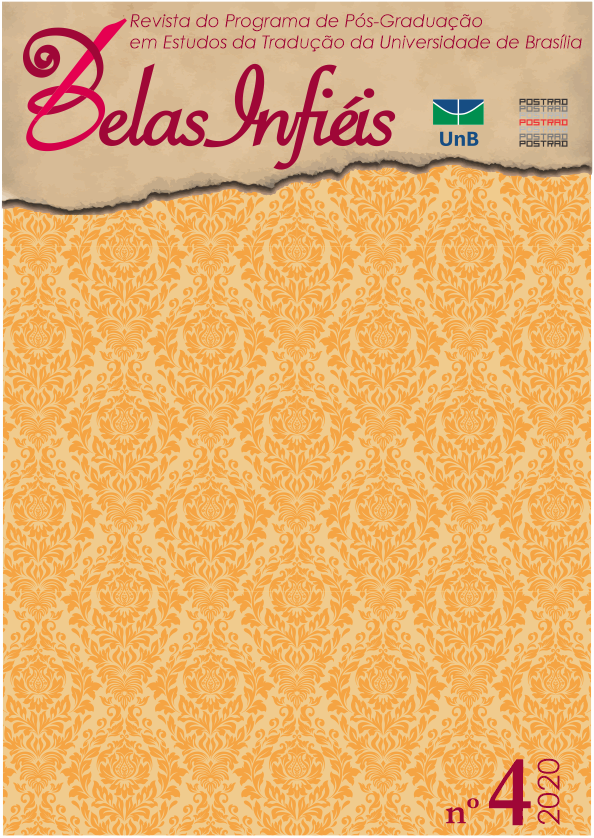Resenha do livro O Processo da Tradução para a Dublagem Brasileira: Teoria e Prática, de Dilma Machado
DOI:
https://doi.org/10.26512/belasinfieis.v9.n4.2020.25061Palavras-chave:
Tradução Audiovisual. Tradução para dublagem. Mercado brasileiro. Teoria. Prática.Resumo
Esta resenha aborda o livro O processo da tradução para a dublagem brasileira: teoria e prática, de Dilma Machado. Trata-se de uma importante obra para a Tradução Audiovisual no país. O advento mercadológico de produtos audiovisuais fez com que o alinhamento entre teoria e prática se tornasse algo imprescindível para os Estudos da Tradução Audiovisual, e é com o viés prático que a autora do livro apresenta a dublagem brasileira em um composto de experiência e realidade mercadológica.
Downloads
Referências
AGOST, Rosa. Traducción y doblaje: palabras, voces e imágenes. Barcelona: Editorial Ariel, S.A. 1999.
ÁVILA, Alejandro. La historia del doblaje cinematográfico. Barcelona: Editorial Cims, 1997.
ÁVILA, Alejandro. El doblaje. 4. ed. Madri: Cátedra, 2011.
BARBOSA, Heloísa Gonçalves. Procedimentos técnicos da tradução: uma nova proposta. 2. ed. Campinas, SP: Pontes, 2004.
CHAUME, Frederic. Cine y traducción. Madri: Cátedra, 2004.
DÃAZ CINTAS, Jorge. In search of a theoretical framework for the study of audiovisual translation. In: ORERO, Pilar (Ed.). Topics in audiovisual translation. Amsterdam/Philadelphia: John Benjamins Publishing, v. 56, 2004, p. 21-34.
DURO, Miguel. La traducción para el doblaje y la subtitulación. Madri: Cátedra, 2001.
IZARD MARTÃNEZ, Natalia. Doblaje y subtitulación: una aproximación histórica. In: DURO, Miguel (Coord.). La traducción para el doblaje y la subtitulación. Madri: Cátedra, 2001, p. 189-208.
Downloads
Publicado
Como Citar
Edição
Seção
Licença
Copyright (c) 2020 CC BY

Este trabalho está licenciado sob uma licença Creative Commons Attribution 4.0 International License.
Dado ao acesso público desta revista, os textos são de uso gratuito, com obrigatoriedade de reconhecimento da autoria original e da publicação inicial nesta revista
A revista permitirá o uso dos trabalhos publicados para fins não comerciais, incluindo direito de enviar o trabalho para bases de dados de acesso público. As contribuições publicadas são de total e exclusiva responsabilidade dos autores.
Os autores, ao submeterem trabalhos para serem avaliados pela revista Belas Infiéis, mantêm os direitos autorais e concedem à revista o direito de primeira publicação, sendo o trabalho licenciado sob a Creative Commons Attribution License Atribuição 4.0 Internacional (CC BY 4.0).



















